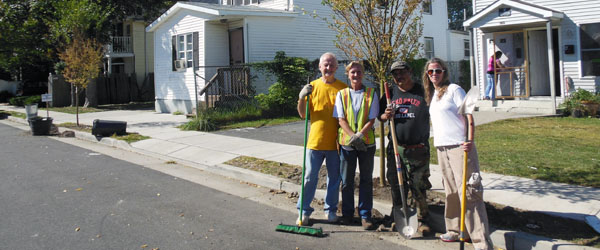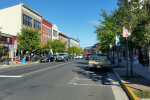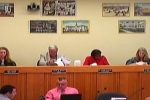American Forests starts ‘ReLeaf’ plantings in Asbury
40 saplings planted on DeWitt Avenue
America’s oldest national nonprofit conservation organization kicked off the ground work for their “Community ReLeaf” program in Asbury Park Saturday, planting two scores worth of trees on the west side of town.
Residents and members of the city’s Environmental and Shade Tree Commission [ESTC], along with representatives from American Forests, the New Jersey Tree Foundation[NJTF], IKEA and Bank of America, planted the 40 new trees along the east and west sides of Dewitt Avenue between Bangs and Springwood avenues.
The city’s ESTC is responsible for having planted the equivalency of 28 football fields worth of trees, as measured by their aerial coverage, since 2002, according to ESTC chair Tom Pivinski [at right].
Pivinski and his group assisted planting American Maples on the west side of DeWitt, where there are no electric wires for the trees to interfere with as they grow. Elm trees were put in on the east side where they will not grow so tall as to interfere with the power lines currently in place.
Before rolling back their sleeves and lacing up their boots, representatives from the NJTF and the ESTC canvassed the area in the days prior to the planting, to ask residents if they wanted the trees on their property.
Only a few declined, mostly because they were renters that could not speak for their landlord’s property. The majority welcomed the new additions — some asked for two or three, according to Lisa Simms, executive director of the New Jersey Tree Foundation [NJTF].
“They are beautiful,” said DeWitt Avenue resident Pete Johnson. Johnson asked for two trees to be planted in front of his house, “because that sun is just unbearable at 2 o’clock,” he said.
“This is a wonderful project, it gives new life to DeWitt and to the community,” said Lori Ross, board president of the West Side Community Center. “It’s a real burst of energy to the west side.”
The effort demonstrates a commitment of all parts of the city to the west side of town, Ross said.
For the next few months, Ross, Johnson and other residents who have trees on their property will have to pay that commitment forward to the new block additions, which require around 20 gallons of water a week if there is not ample rain, according to Simms.
Besides the aesthetic benefits the trees provide to the block, there are several psychic and emotional benefits to trees, according to Sloan. They are scientifically shown to reduce stress, lengthen attention spans and reduce levels of domestic violence as compared to areas where there are little or no trees, she said. In addition, studies have found people in hospitals who can look upon trees outside of their windows tend to have faster rates of healing than those who cannot, said Lea Sloan, vice president of communications and marketing for the national nonprofit.
The saplings come to Asbury Park as part of American Forest’s “Community ReLeaf” initiative to study the environmental impacts of urban forests in five US cities — Atlanta, Ga., Detroit, Nashville and Pasadena, Calif. are the other four. The nonprofit organization considers any green structure within an urban community part of the urban forest ecosystem.
Each project is unique to each individual city. In Asbury, the project is tailored to assess how the urban forest is impacted by natural disasters like hurricane Sandy. The information gathered will serve to inform future urban forest restoration to best benefit communities that face similar threats.
They selected Asbury Park because “it is a combination of a historic, iconic town and a small community where American Forests felt they could make a difference,” according to Sloan. “The trees will make a huge difference on the block.”
“These trees are going to totally transform the street,” said American Forests CEO Scott Steen. “Trees are not necessarily the first thing you think of when it comes to recovery efforts after a major storm event, but they serve to finish things. They create a sense of normalcy.”
“The city is proud to be part of a national project that was kick started in Asbury Park,” said Councilwoman Amy Quinn. Quinn is also a member of the ESTC.
To see a photo album of the day’s activities, click here.
[Photo at top: From left to right, ESTC chair Tom Pivinski, NJ Tree Foundation Executive Director Lisa Simms, ESTC member Jorge Chavez and Councilwoman Amy Quinn stand in front of one of the newly planted trees on DeWitt Avenue.
————————————————————
Follow the Asbury Park Sun on Facebook and Twitter.















